“Molly is…” I prompt, hoping to coax her to share vulnerable, inspiring details about herself. We’re sitting in the almost empty former Runaway apparel space at American Underground @ Market, which currently serves as the office of BetterOn, a video training company.
“Molly is tired,” she says with an easy laugh. She’s 2-hours into being interviewed on camera – in the middle of her already busy day – and she still has an easy grace about her. “Molly is weird,” she continues with thoughtful energy. “I feel deeply…but I’m also fun! Molly’s fun!” she declares. “I’m funny and I like to have fun. I have a lot of energy. I think I’m a really good friend too.”
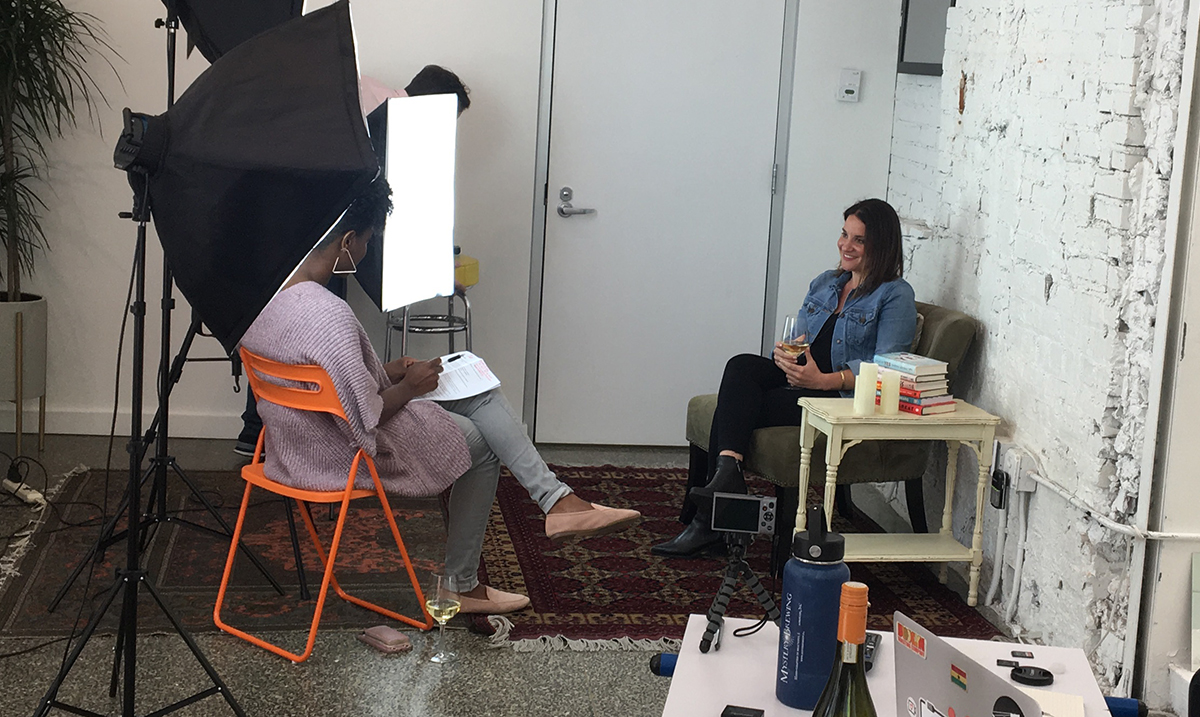
Behind the scenes of interview.
Molly Demarest is all these things, but you might know her because she’s also the new General Manager for the American Underground, one of 11 Google for Entrepreneurs tech hubs in North America and what CNBC called the “Startup Capital of the South.”
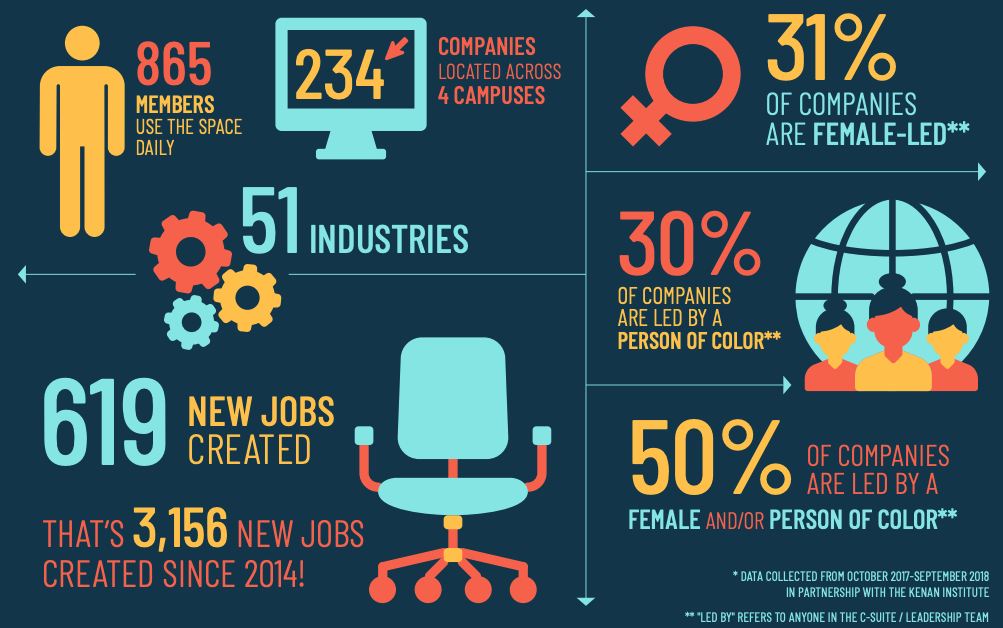
From American Underground 2017-2018 Annual report
American Underground, AU for short, has supported more than 900 companies, has created 3,196 net new jobs and has headquartered companies that have raised more than $157 million. As Molly explains it:
“American Underground is a place where you can come as a beginner, make all the mistakes, learn all the things, but ultimately figure out what your gifts are so that you can grow and lead. That’s been my personal story and my hope is that it continues to be a story for a lot of other people.”
Molly’s story, in particular, is the reason why we’re all sitting in this all-white, sunlight room – drinking Moscato – on a Tuesday afternoon. As a three-time client of Pathos Ethos and a woman many of the Pathos Ethos staff would consider a friend, Molly is just the type of authentic leader PE likes to work with and she has a great story; one that’s perfect for the first Pathos Ethos client profile.
Map-Making
Long before Molly was strategizing the future of entrepreneurship in the Triangle, she was making maps of Durham. Literally.
“I have a map that I drew of Durham, I’m like seven years old,” she says with a grin. “A map where my house is, where my church is, where my school is…and I labeled the roads.”
Molly’s family moved to Durham, in the middle of the school year, when she was 7 years old. Young Molly left her small private school outside of Washington, D.C. where she attended classes alongside her cousins and was thrust into a new world of the Bull City. The transition was difficult, so Molly took things into her hands and crafted her own map of the city to help orient herself. Seeing the big picture and understanding how things connected were values instilled in her by her parents. The Demarest household taught Molly to value learning, nature, outside play and building things.
“I remember growing up a lot of my friends would go on these crazy vacations or to Disney World, and we went to national parks, state parks and president houses… and [I was] so jealous of people who didn’t have to listen to NPR in their car,” she laughs and remembers thinking “‘These friends get to listen to music! They are lucky, they are living the good life.’”
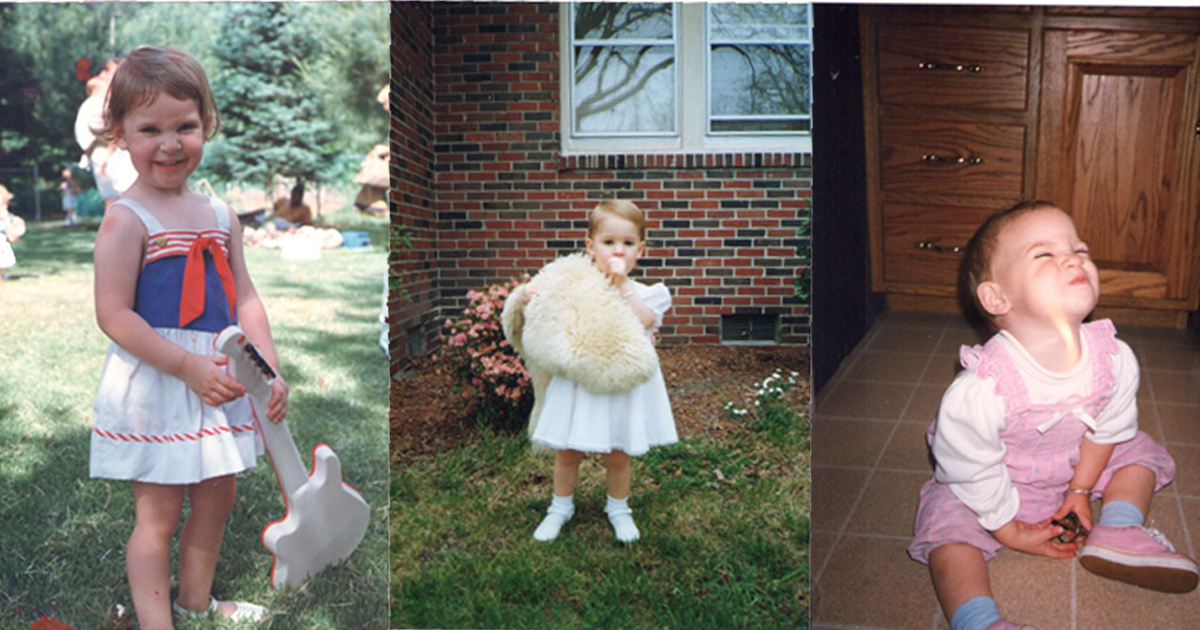
Young Molly
“So, there’s this woman named Edie (Oakley) that I met when I was in high school,” she recalls. “She’s a Duke Integrative Health Coach… so we would trade the health coaching for babysitting some. That wheel of health molded how I saw how I wanted to live my life…if you’re only caring for part of who you are, you have a flat tire. You can’t drive a car with a flat tire.”
That wheel of integrative health, that Molly mentions would be a core tool for her developing and maintaining a harmonious personal and professional life as she continued on her journey.
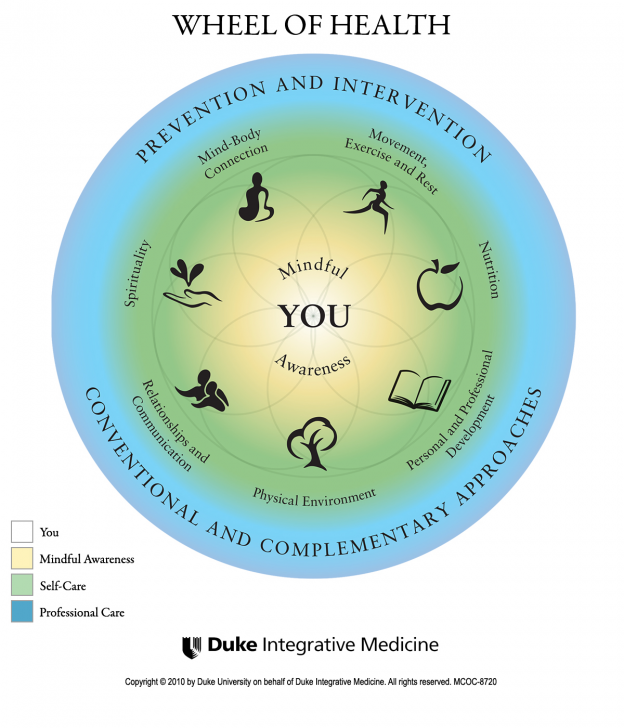
Wheel of Health, Duke Integrative Medicine.
Accounting and App State
When Molly started thinking about attending college, she knew four things for sure: she wanted a smaller classroom environment, she wanted a football team, she wanted to study business, and she did NOT want to write an admissions essay. So she applied and was accepted into Appalachian State University.
“I thought I wanted to do marketing,” Molly admits. “I took an accounting class, and I did really well and it just clicked. That’s just the way my brain works, I guess. And so I had someone say ‘If your brain works like that, then just go with it. You could do marketing still…but if you think the way accounting works, then just go with that and that will open up a lot of doors for you.’ so I just did it.“
But something about a traditional business path didn’t feel exactly right for her. She looked to her peers in business and wasn’t sure she wanted the lives they had.
“I just felt like I kept talking to people that had made a lot of money, and were doing big things, but if you talked to them more, there was always something they wished they were actually doing.”
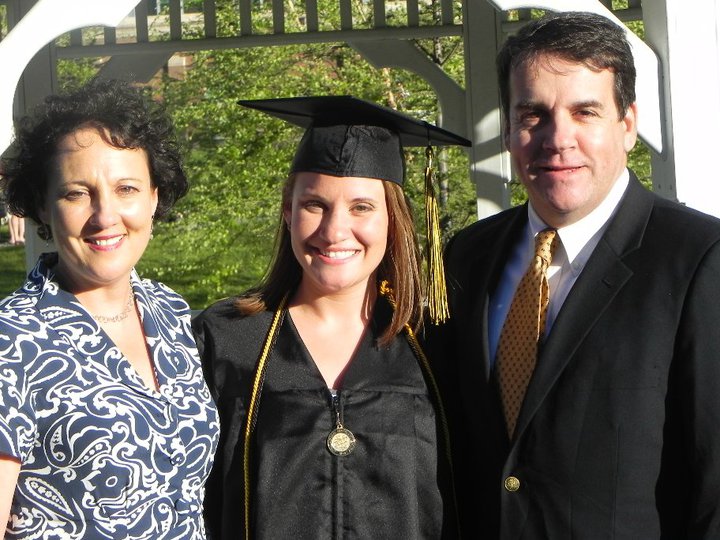
Molly and her parents at her college graduation.
In college, Molly had the opportunity to work on the Racial Justice Act for North Carolina. That experience, combined with her upbringing, cemented for her that there were other things that mattered beyond traditional business – and specifically, that equity and access must be built into the structural foundation of businesses and communities for them to thrive. How that translated into a career, was yet unknown, and, alas, Molly graduated from college in 2010, the US was just out of a recession and she needed an actual job. So she stayed on the accounting path which ultimately led her to the American Underground in 2013 in her first role there as Director of Operations & Community Development.
At that point, Molly has a fresh job at a promising company, but she still thought she needed to do accounting.
“I was like ‘Great, I’m going to get my CPA, I have everything I need, I just need to take these tests.’ So I did that. I passed three of the four exams, missed the fourth by a point…I was really wrestling with, do I go back and spend all this time getting a CPA?”
These were the thoughts running through her mind while still fresh in her first role at AU. Then Molly went on a retreat that changed the trajectory of her career. During the retreat someone said to her: “I feel like what you’re called to is leading people, not accounting, and you’re to put this to rest.” And Molly says, from there, “I never looked back.”
Underground and Overwhelmed
When I ask about the early days of AU, Molly’s voice raises a bit with emphasis: “Holy cow, they were so stressful! I never want to relive that again.” Molly and then Chief Strategist Adam Klein and the rest of the early AU team were working to grow an entrepreneurial ecosystem in a Downtown Durham that was still re-emerging. Looking to the community to support the process was crucial. In regards to the process of managing everything that came with AU, Molly says Adam advised “We can’t be the God over all these things. We can only do but so much.”
As a matter of survival during those early days of building a startup to support startups, Molly looked to her community to lead, invited the whole ecosystem into the decision-making, and collaborated to create impactful and intentional results. The best metaphor for this in practice at AU: The coffee.
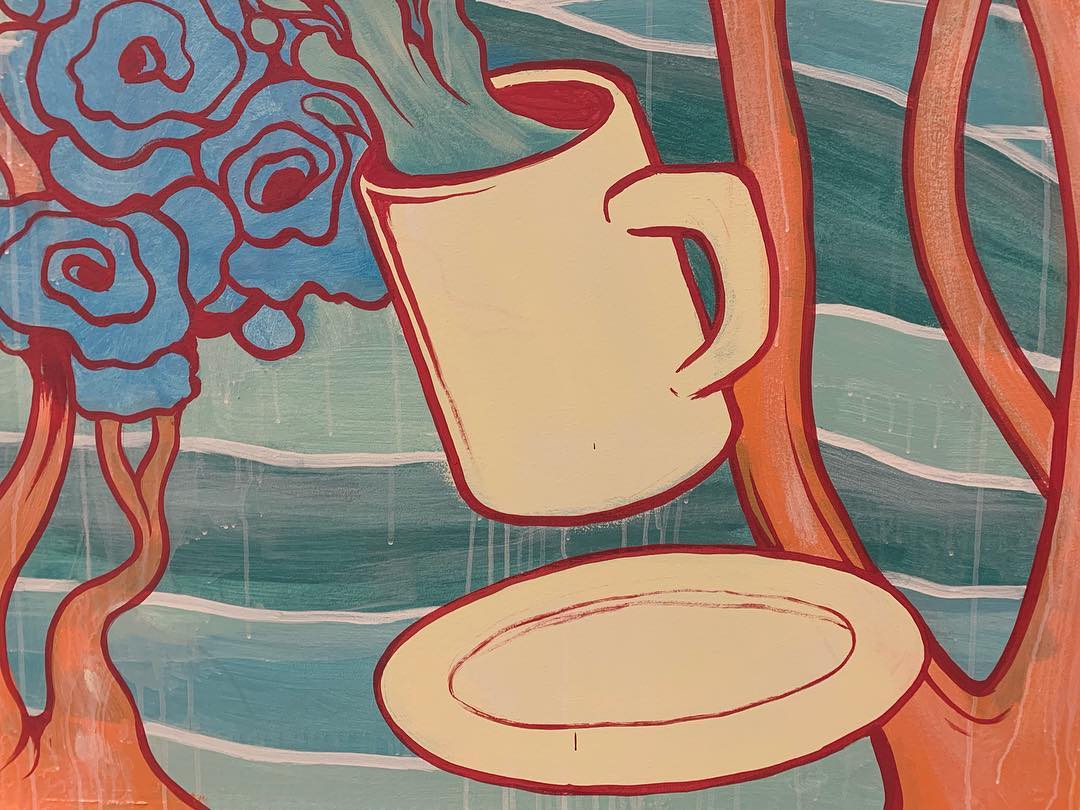
Coffee, as depicted in the new AU @Main by artist Gabe Gets. (From AU Instagram)
The early AU team made the (wise) decision to provide free coffee to members, but they didn’t know how they would go about it. While Molly credits Beyu Caffe as a “huge partner” for them in the early days, as AU scaled (and as Beyu scaled), they needed another coffee option. The team thought about adding a cafe but talked to the local restaurants, for whom they did not want to be competition. They also wanted their members to engage with the community around AU and not remain insular to the building. So they partnered with Larry’s Coffee for brewed coffee. Later, Tom Rau made a video to share with his fellow AU members on how to brew the coffee for themselves.
The “coffee situation” was, like many things in the startup world, an iterative process, that ultimately led to a collaborative solution.
“I saw the AU community as peers,” Molly admits. “We were all building something new. It’s just, our customers happened to be in and around every day.”
But building things, especially when you’re experiencing high-growth – AU expanded to 5 locations (4 in Durham and 1 in Raleigh) as of 2017 – comes with its challenges, and after four years and two other roles at AU, Molly needed another challenge. Molly left American Underground to become the Director at Big Top. She was now tasked with scaling access to talent in the region; it was then Pathos Ethos began working with Molly to develop the first Big Top website.
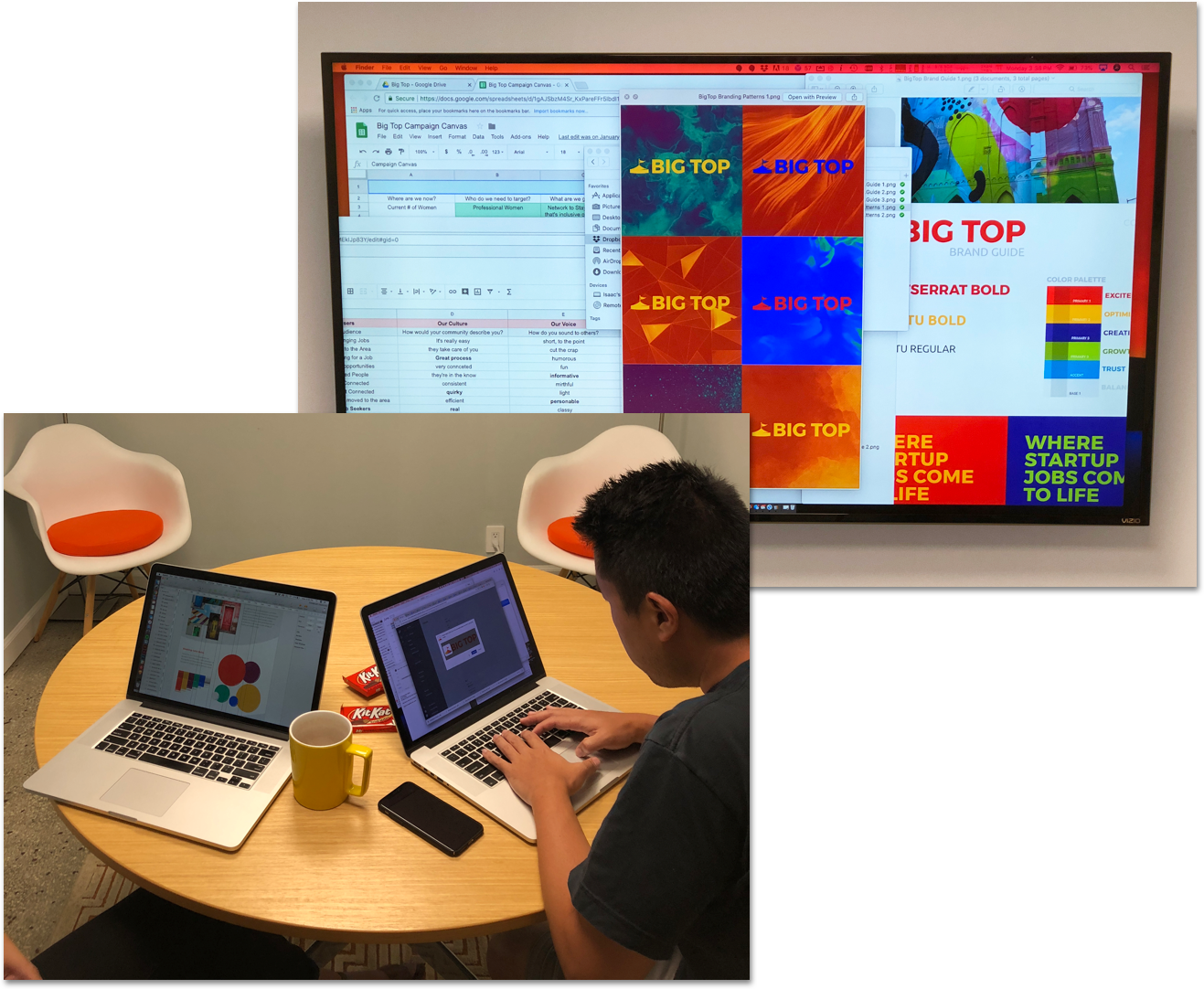
Pathos Ethos CEO Isaac working during discovery phase of redesigning the Big Top brand.
Enter Pathos Ethos
“I’ll never forget the day I met Isaac (Pathos Ethos CEO and Co-Founder),” Molly says with a slight smile. “We had just announced that we bought Big Top and at the time we also had ExitEvent which was the media platform. And we were trying to figure out who does what, where does this go… I realized Isaac cared more about me understanding what was behind all the things so that I could make decisions and I was like ‘Okay, you’re not trying to sell me. Okay, I trust you.’”
But it wasn’t just the Pathos Ethos technical expertise and authenticity that impressed Molly, it was the team’s empathy and focus on equity.
“What really made me trust their team was: we were having some conversation around figuring out the product and what’s the business model around it for Big Top. Something was being talked about that essentially would probably help white people more in the recruiting process, give them an advantage… Isaac was just like… ‘Hello! No, we can’t design a product that does this thing.’”
Molly credits the Pathos Ethos team for being a partner in, not just Big Top’s brand, website, and software development, but also her goal of developing a more inclusive entrepreneurial ecosystem in the Triangle. While Molly was at Big Top, Pathos Ethos crafted an entirely new brand and a software platform for the organization that aligned with those inclusive values.
Big Top presented a new mission for Molly, but it was located in the same environment: American Underground.
“How do you take a new role, focused on something completely different in a similar environment?” she asks herself. “I had to work really hard to create boundaries; when people would ask me questions about, ‘Hey, what’s going on with this?’ or, ‘That light bulb’s out,’ or whatever the thing was, to say, ‘Great,’ and direct them to the AU team… But it’s hard because I poured so much of my life into it and I think what I was reminded of is my identity is not tied into it.”
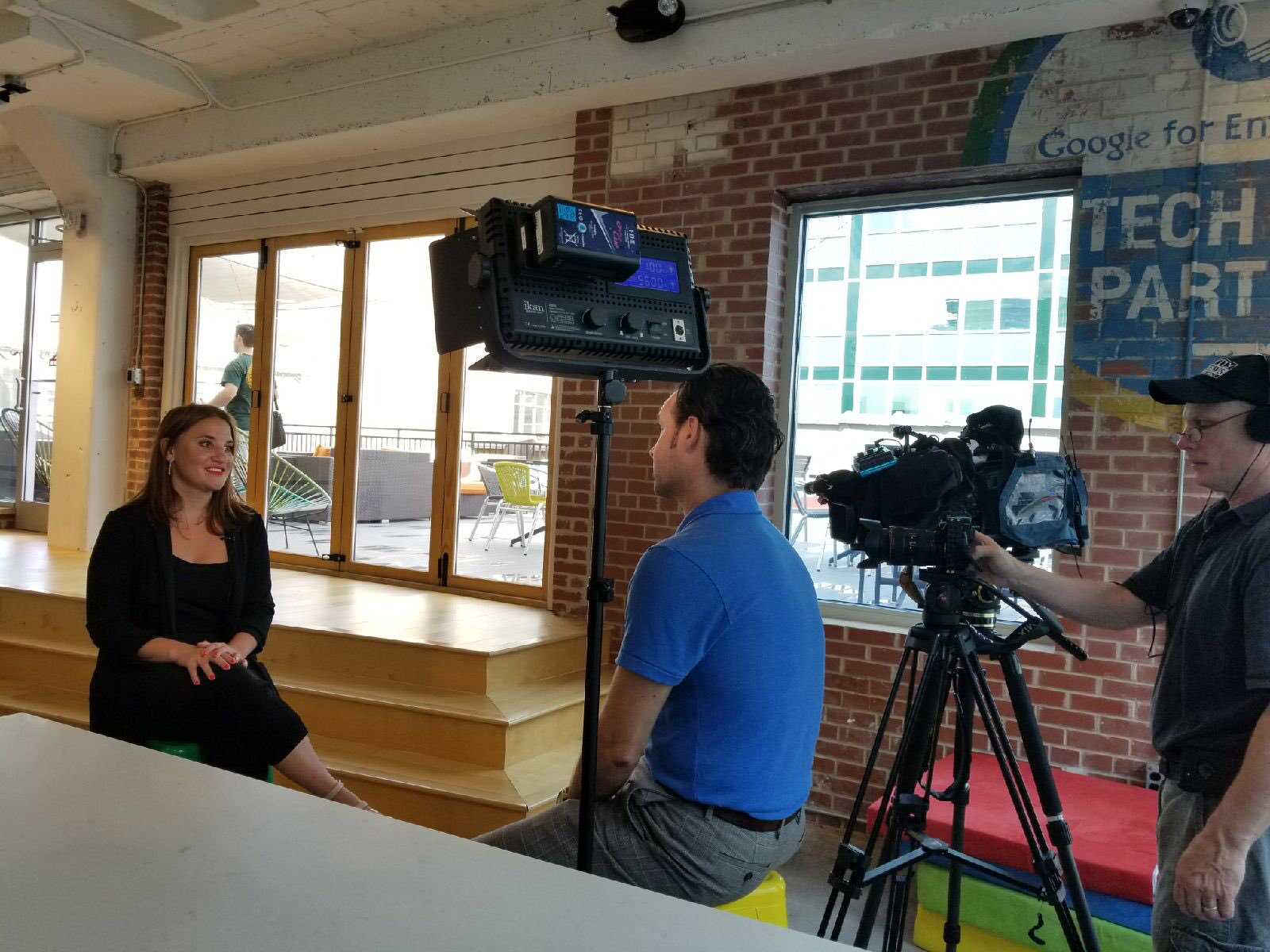
Molly chatting with WRAL about startup growth in the Triangle for Big Top. (from Big Top Twitter)
It, meaning American Underground. But AU wasn’t quite done with Molly yet. Less than a year after Molly took the role at Big Top, Capitol Broadcasting Company (CBC) – the parent company for both American Underground and Big Top – found itself in a weird position: with two brands focused on one similar community. CBC took a step back and realized that there was a better way to allocate resources. After the decision was made to merge the two companies, Molly was forced to think about what that meant for her future.
“One thing I really appreciated from Adam was that he said ‘You don’t owe us anything. This is the time for you to say: is this what you feel lead to do? You’re not tied to us; so, total freedom for you to really think objectively. You’re not gonna hurt anyone’s feelings.’”
Once Capitol Broadcasting Company started the discussions about the competing brands, things moved pretty fast for Molly. She was being asked to step up and lead American Underground in a way that she hadn’t yet.
“I didn’t say yes right away. I wanted to make sure that it’s what I wanted to do. I wanted to make sure that it was a really good opportunity for me and where I wanted my career to go and that I was going to have the resources that I needed to do the job well.”
So, in a world where men are four times more likely than women to ask for a raise (according to That’s What She Said by Jane Lipman) Molly gave CBC a directive: give me a competitive offer as if you’re recruiting me from outside the region … and let’s get aligned on where we are going as a company.
From Big Top to BIG JOB
In January 2019, Big Top and American Underground officially merged and Molly stepped in as the General Manager for the combined organization and Pathos Ethos continued their journey with Molly to reimagine the new AU brand, deepen their customer engagement strategy, and expand their software product.
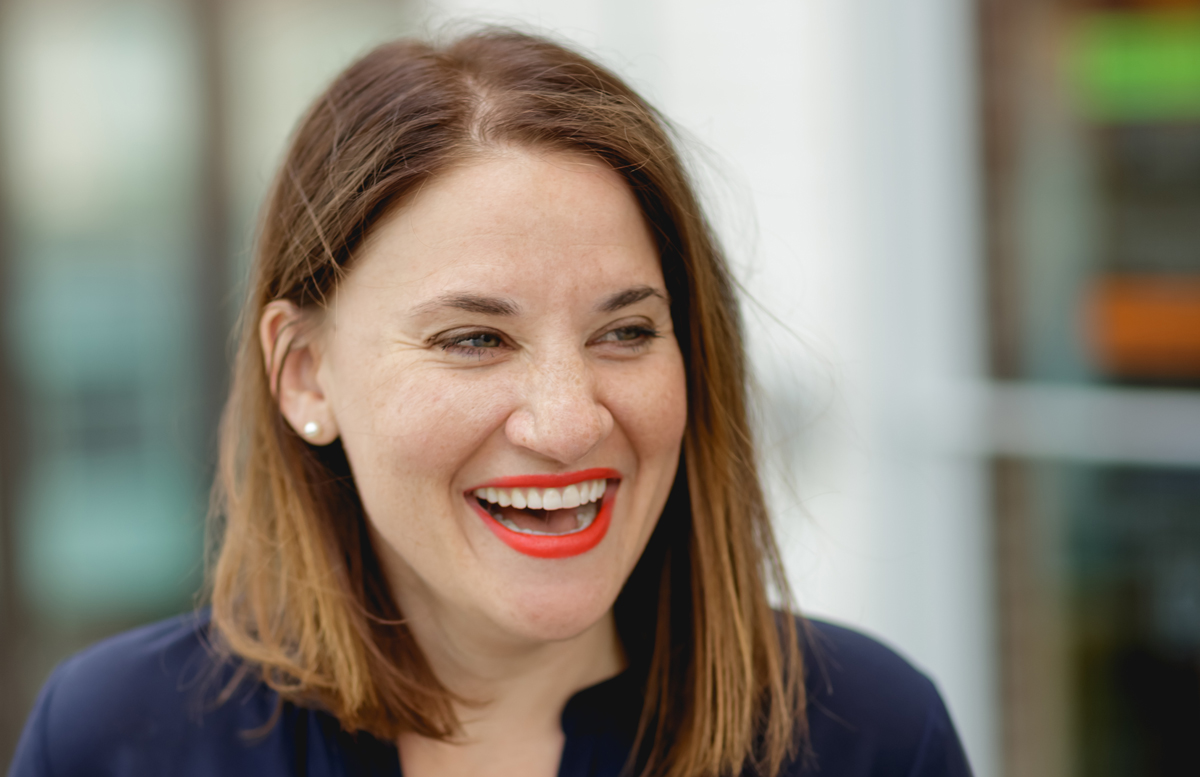
“I went from being the number two executer making sure all the things happen, to I’ve gotta set the vision and make sure all the things happen, but not be the one that makes all the things happen in the same environment,” she says of her new role. “And I think I’m doing a pretty good job at that,” she admits with a nod.
I believe her. Don’t forget, this is the same woman who once drew a map of Durham to orient herself in a new environment. She was made for understanding communities and conquering new challenges. She was also made for leading this charge.
“I just read a book called, The Courage to be Disliked. It’s pretty good,” Molly shares, riffing off a conversation we’re having about leadership and building a good foundation from which to lead. “I think if you don’t have a foundation to lead from with that though, it can be harder to do that. Which is why knowing who you are, how you’re wired, and being healthy is really important…I’m at a point where I’m like, ‘Here’s who I am.’ I’m willing to take feedback and evolve and grow because I’m not saying that I’m perfect.”
For Molly, her leadership foundation is rooted in her childhood, her learnings – like discovering the importance of work/life harmony from Edie Oakley, the integrative health coach who Molly now considers one of her best friends and mentors, or her early AU lessons on leadership and management from Adam Klein – and her experiences. Molly is the type of leader who recognizes that good support systems and encouragement have played a crucial role in her journey, and she looks to pay it forward in her leadership style.
“There are some people that haven’t had the privilege of being raised in an environment where they could trust a foundation. So I think some of that I can’t change that for them. In those situations, I look at and say ‘Okay, I can’t be the savior in this situation, but what I can do is affirm something that I do see in them in this moment.’ So, even if it’s something small, trying to do that and encourage them. Really wanting people to feel seen, in my interactions.”
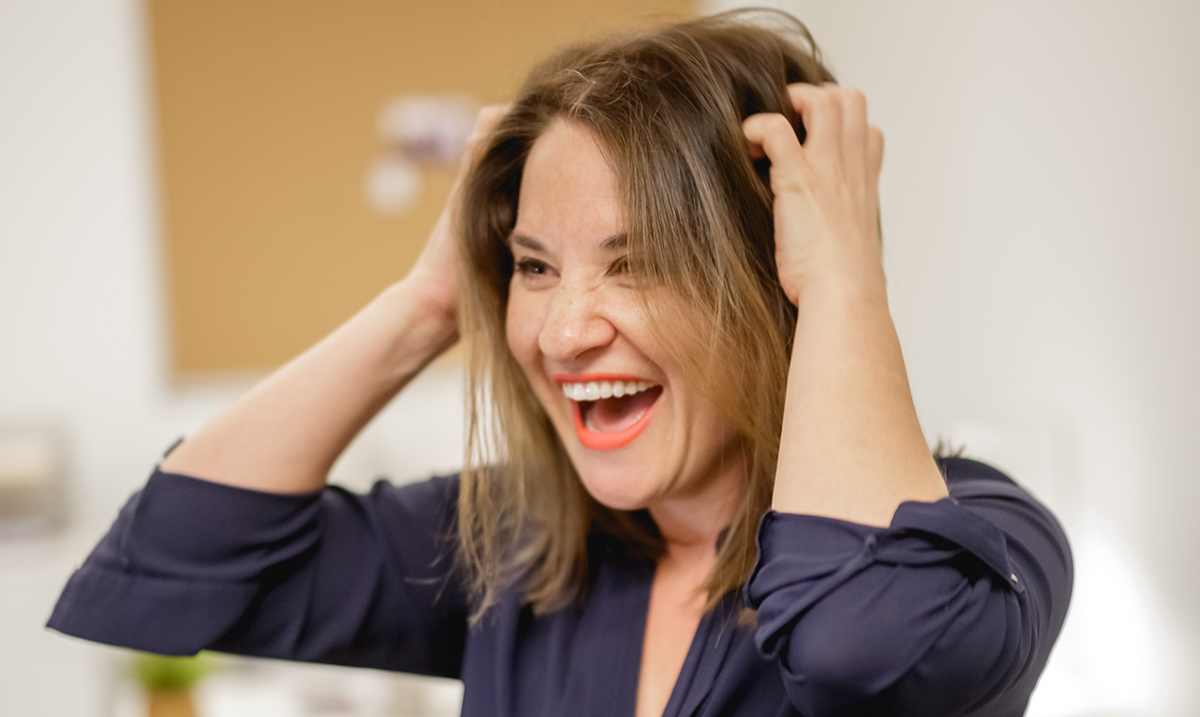
This caring, supportive leadership style will serve her as she now leads the team forging a new path for AU. Although she was quick to tell us “Molly is not American Underground and American Underground is not Molly” it’s clear this inspiring leader has made her mark on the AU and on Durham.
As Molly puts it: it’s a big job. And she admits to wondering how people will see her in this new role.
“I don’t wanna lose the human side…So I guess I ask myself a lot ‘how can I live in a way that tells a different story?’”
Pathos Ethos is excited to see how her story develops and proud to support her as she continues to new heights in her career.
